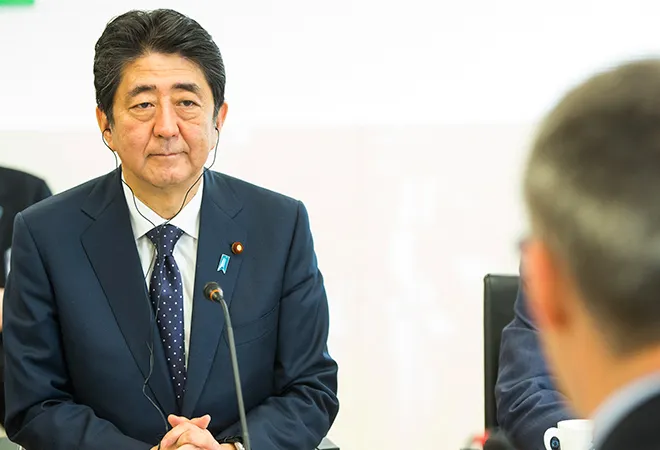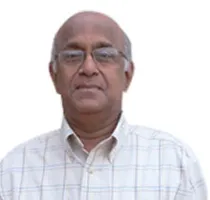-
CENTRES
Progammes & Centres
Location
In the midst of various diplomatic engagements, Abe will find it hard to take up the issue of constitutional amendment.

Earlier this month, Japan went to polls to elect half the members of the House of Councilors (HOC), the upper house of the Japanese Diet. This was the sixth parliamentary election Prime Minister Shinzo Abe faced. It is remarkable that in all these elections he has succeeded in getting the majority of seats in both houses.
The present election, conducted on 21 July, carried considerable importance due to two reasons. Primarily, unless Prime Minister Abe seeks an unlikely fourth term beyond 2021, this could be his last upper house election. Secondly, since Abe had already set his sight on amending the Japanese Constitution by 2020, the outcome of the present election was considered very crucial for accomplishing that goal.
In the Japanese legislative structure, the HOC is less powerful than the House of Representatives (HOR) though the voters directly elect both. Members of the HOC are elected for a period of six years wherein one half of the total 245 members face election every three years.
Though less powerful than the HOR, the upper house is not a mere rubber stamp, but has an important role to play in the legislative sphere. It can cause considerable delay in the passing of laws if the ruling party does not enjoy majority strength in it. This phenomenon was witnessed in the house during the first decade of this century leading to acrimonious situations in the house.
The HOC enjoys coequal power with the lower house in the domain of constitutional amendment. Article 96 of the Constitution states that any proposal for amending the Constitution should be endorsed by a two-thirds majority of the total members of both Houses of the Diet. Since the ruling Liberal Democratic Party (LDP) under Abe did not enjoy the requisite numerical strength, it could not seriously push through any proposal for amendment.
During the election campaign, constitutional amendment was not flagged as the critical issue at stake. The voters were showing more concern in subjects like the impending consumption tax hike, pension, and social security issues. The voters’ apathy to the upper house election was clearly visible in their low turnout of just 48.8%, which was second lowest in recent years. The last time when it fell below 50% was in 1995 (44.52%).
The results of the poll show that the ruling LDP coalition, consisting of the Komeito and the Nippon Ishin (Japan Innovation Party), has failed to capture the requisite of two-thirds majority in the house. With 79 uncontested seats, the pro-amendment parties needed to win at least 85 seats to hit 164 — the two-thirds target. But, three parties together fetched only 160 seats, running short of the magic number. This is not to ignore the fact that they still enjoy comfortable majority to get ordinary bills passed.
With less than the requisite numerical strength in the upper house, the question that comes up is, what are the chances for Abe to achieve his long-cherished dream? Most importantly, he has to carry along his own political ally, the Komeito who have a different view on amending Article 9 of the Constitution. Komeito’s powerful religious wing, the Soka Gakkai, and its vast followers have reservations about Abe’s plea for adding a new provision to Article 9, giving constitutional recognition to the existence of Japan’s Self-defence Forces.
Soon after the announcement of the results, Abe stated that he would adopt a ‘flexible approach’ towards other parties while seeking their support.
Secondly, he has to work out a strategy by which he could try to woo some opposition parties and convince them of the necessity to revise the Constitution. He would like to target some like-minded leaders inside the Democratic Party of the people that have 21 seats in the upper house. But the leader of the party, Yuichiro Tameki, has clarified that there are many moot points like how to define the right of self-defence and how to form military missions under the Constitution that need to be sorted out first. Obviously, it will take a long time to have unified view on these ticklish questions.
Even after winning the election, there is not much of a change in Abe’s position. He has to build a national consensus in the midst of numerous other pressing domestic and diplomatic issues and it is a daunting challenge.
At home, he has to carefully navigate serious issues connected with people’s pensions and social security. Common people often worry about the impending increase in the consumption tax from 8% to 10%. The long pending hike will come into effect from October this year. In addition, Japan has to organise the next Summer Olympics next year. It calls for meticulous preparations and enormous expenditure too.
Externally, Abe, despite his seemingly close equations with US President Donald Trump, has to sort out the bilateral trade issues with the US. During President Trump’s visit in May earlier this year, he had the privilege of being the first foreign dignitary to meet the new Reiwa Emperor. Nevertheless, the latter made it clear to Abe that he would take up the trade issues with Tokyo after the upcoming upper house election in Japan. With the US Presidential election around the corner, Trump’s unpredictability will pose challenges to Abe both in the diplomatic and economic spheres.
The Korean Peninsula is yet another problematic area for Abe. Despite the initial optimism, the US-North Korea talks have gone totally awry and it is frustrating for Abe to be a bystander with no real involvement in the Korean peace process. His expectations to resolve the abduction issue have been belied too.
Relations with South Korea have also been embittered by a series of controversies, including the ‘comfort women’ issue. But now, there is a serious trade war going on between the two on the question of Japan’s restricting its export of sensitive semiconductor technologies to South Korea. Both countries have taken the case to the World Trade Organisation (WTO) and bilateral relations may witness further estrangement.
Lastly, Abe is also interested in building new bridges of understanding with China and as part of this policy, he is keen to arrange President Xi Jinping’s official visit to Japan during the first quarter of next year. In the midst of all these diplomatic engagements, Abe will find it hard to take up the issue of constitutional amendment.
Does it mean that he may try for one more term of the party presidency beyond 2021 as suggested by Toshihiro Nikai, an LDP bigwig?
The views expressed above belong to the author(s). ORF research and analyses now available on Telegram! Click here to access our curated content — blogs, longforms and interviews.

K.V. Kesavan (1938 2021) was Visiting Distinguished Fellow at ORF. He was one of the leading Indian scholars in the field of Japanese studies. Professor ...
Read More +